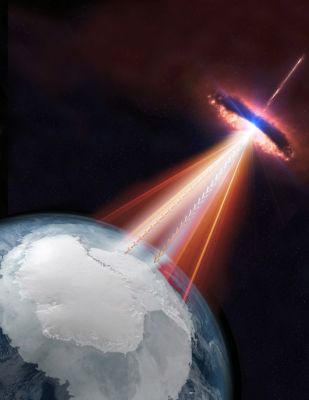
IceCube/NASA
Neutrinos have been helping physicists solve some long-standing puzzles, over the past couple of months, while raising whole new ones. On the latest edition of the podcast, we chat with astrophysicist Azadeh Keivani, of Columbia University, in New York, about her work with the IceCube collaboration, at tracking the source of a high-energy neutrino to its source--a distant galaxy, 4 billion light years away--for the first time. (The image on the right is an artistic rendering, showing neutrinos and gamma rays being emitted that could be detected by the IceCube Neutrino Observatory as well as by other telescopes on Earth and in space. Credit: IceCube/NASA.)
That's one mystery solved, but then we talk with particle physicist Richard Van de Water, of Los Alamos National Laboratory about his work on the MiniBoone experiment at Fermilab, where they may have found signs of a new type of neutrino--the sterile neutrino--backing up an old claimed discovery of this particle from the 1990s. If it's not a sterile neutrino, it still shows that something weird and new is going on. What might it be? Another particle? Extra dimensions?
August 26, 2018
High-energy neutrino traced back to a distant galaxy, with Azadeh Keivani; possible discovery of sterile neutrinos, with Richard Van de Water; black holes replaced by fuzzballs, with Samir Mathur; finding an almost-quantum theory, with Miguel Navascues; and testing free will with AI, with Avi Loeb.
Full Podcast
Next up is FQXi's
Samir Mathur, of The Ohio State University, who has been making headlines around the world thanks to his idea that black holes should be replaced by fuzzballs, tangled balls of stringy matter. He talks to Sophie Hebden about how this would solve the
black hole information paradox, and re-write the big bang, possibly even doing away with the need for inflation. You can find out more about his work in Sophie's article, "
Fuzzballs vs Black Holes." So, should we give up on the idea that black holes are cosmic monsters that suck everything that falls past their surface, or event horizon, to their infinitely dense core? And instead embrace this fuzzier picture?
Miguel Navascues, of IQOQI, Vienna, meanwhile, has been searching for an "almost quantum" theory that will usurp our current standard version of quantum mechanics. He explains to Colin Stuart just why he thinks it is only a matter of time before experiments reveal a flaw in the current quantum framework, and how he is preparing for that eventuality. Colin has also written an article, "Usurping Quantum Theory" about this quest.
And finally, Harvard's Avi Loeb muses about whether developments in artificial intelligence and machine learning will enable us to test whether free will is real, emergent, or an illusion, with reporter John Farrell.
So what do you think? Do we have free will? Do you think that machines could potentially exhibit it too? And if free will is an illusion, do you agree with Loeb that it may be better if people never learn this?